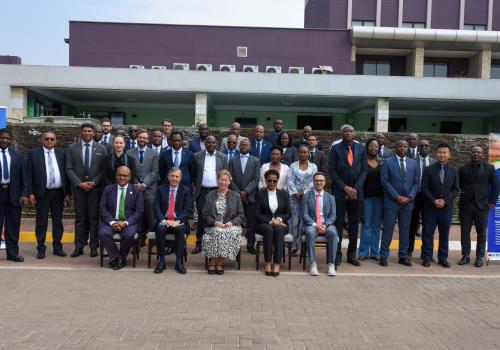The United Nations Office for Disarmament Affairs (UNODA) and its Regional Centre for Peace and Disarmament in Africa (UNREC), in collaboration with the Southern African Development Community (SADC) Secretariat and with the financial support from Germany, organised an Informal regional meeting on the implementation of the Global Framework for Through-life Conventional Ammunition Management East and Southern Africa. The meeting was held in Gaborone, Botswana from 24-25 September 2024 with the aim to raise awareness of this new international arms control instrument.
Addressing the meeting, United Nations Resident Coordinator in Botswana, Mr. Zia Choudhuryemphasised that effective ammunition management plays a crucial role in promoting peace and sustainable development in East and Southern Africa. He highlighted that proper management can help reduce the demand for illicit ammunition by addressing inequalities and the root causes of conflict. He also warned that the diversion and trafficking of ammunition fuel armed violence, crime, and terrorism, with non-State actors often using its explosive potential for improvised explosive devices. Additionally, unplanned explosions at munitions sites over the years have caused thousands of deaths, environmental destruction, and significant damage to infrastructure.
On behalf of the SADC Director of the Organ on Politics, Defence, and Security Affairs. Ms. Thanyani Gumede, Senior Officer-Police at the SADC Secretariat, highlighted several initiatives undertaken by SADC regarding the implementation of the African Union Master Roadmap of Practical Steps to Silence the Guns in Africa, including observing Africa Amnesty Month. To promote Africa Amnesty Month, the region engages Member States through the Regional Coordinating Committee on Small Arms and Light Weapons (SALW). SADC is also working on developing a comprehensive project to combat the proliferation of illicit SALW and ammunition.
United Nations Office for Disarmament Affairs (UNODA), Officer-in-Charge, Conventional Arms Branch, Mr. Manuel Martinez Miralles, highlighted that before the adoption of the Global Framework, the issue of conventional ammunition had been largely neglected on the global stage. For over three decades, since the topic was first introduced at the United Nations in relation to small arms, no comprehensive global action had been taken. The successful adoption of the Global Framework by the UN General Assembly marks a significant milestone, bringing this long-standing process to a close. It is a notable achievement for multilateral disarmament and arms control, highlighting that despite challenging international political conditions, progress is achievable through compromise, goodwill, and collaboration. He commended member states for their commitment to addressing the safety and security risks posed by conventional ammunition under the new Global Framework.
Ms. Gabriela Bennemann, Ambassador-Designate of Germany to Botswana and SADC, highlighted the alarming challenges posed by the illegal proliferation of small arms, light weapons (SALW), and conventional ammunition. She referred to the latest report by the UN Secretary-General, which revealed a 53% rise in civilian deaths across twelve of the world's deadliest conflicts, with small arms and light weapons remaining the primary cause of conflict-related civilian fatalities.
The Ambassador stressed that strengthening small arms control worldwide is a key pillar of Germany’s policy on conventional disarmament and arms control. In 2023, Germany contributed over 20 million euros to various global projects aimed at addressing this issue. Acknowledging that SALW threatens human security globally, she emphasized the need for action beyond Europe's borders, with Germany supporting efforts in various regions.
Participants discussed existing regional and sub-regional instruments in East and Southern Africa, including the SADC Protocol and the Nairobi Protocol, and explored how these mechanisms can support the implementation of the Global Framework. The importance of needs-driven, integrative, and sustainable approaches to international assistance were highlighted, particularly through the application of the International Ammunition Technical Guidelines and Weapons and Ammunition Management Baseline Assessments ,the meeting objective was to increase understanding of gender considerations with respect to conventional ammunition and will focus on avenues to strengthen gender mainstreaming and the full, equal, meaningful and effective participation of women in through-life conventional ammunition management.
SADC is conducting regional training to equip law enforcement agencies with the skills and knowledge necessary to effectively prevent, investigate, detect, and prosecute cases involving the illicit trafficking of SALW and ammunition.

